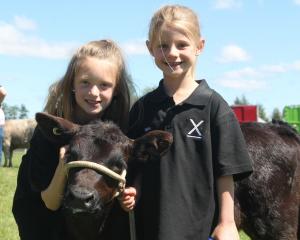
On Neil and Chris Thomson’s West Otago dairy farm, the farming philosophy is fairly simple — figuring out what works that looks after both the animals and the soil.
And Mr Thomson says thinking outside the square is paying off, as he reckons the past few years have seen the healthiest cows he has ever had on the property.
It is a philosophy that is also shared by his contract milker Khan Ward, who has had a long involvement in the dairy industry and who has been on the property, which milks 560 cows, for the past five seasons.
Mr Thomson, who has been farming on his own right since 1987, started farming organically in the late 1990s.
In 2011, he and his wife bought a neighbouring block — the farm which he grew up on — with some equity partners, and converted to dairy.
But it was too risky with the conversion to carry on with a certified organic system, although he had no regrets about making that initial move, saying it was worth doing.
Before moving to the Thomson farm, Mr Ward had seen first-hand what farmers in other scenarios used to grow grass and farm — and a lot of time was being spent "fixing things" rather than being proactive.
"Prevention is better than cure," he said.
He discovered he and Mr Thomson were thinking along the same lines and it was something that he wanted to be part of.
But, when it came to their hybrid system, it was not about big changes on-farm.
Rather, it was "all the little things"; from what kind of grasses they were growing, what they were feeding that grass with and then noticing what came out the back of a cow.
It was also about how the crops were grazed and the benefits from grass having a longer period to recover.
They now sowed more than 15 plant species, including different varieties of bromes, cocksfoot, fescue, timothy, herbs and clover.
That mix meant a variation in root depths, which was beneficial at different times of the year, while it also performed better than traditional ryegrass during climate extremes, Mr Thomson said.
Previously, there could be a period where there was a gap in the feed wedge which had to be supplemented, but if different species were introduced then that naturally filled it.
Some of the plants were also very nutrient dense, compared with ryegrass, so animals needed less.
Mr Ward had noticed if a paddock only had one species of grass in it, the cows would "walk in and walk up and down", searching for what they wanted to eat, but when they went into a mixed species paddock, they tended to stand still.
Feed was strip-tilled into any bare ground.
Reproduction rates were also now better than the district average, animal health costs had come down and they had "just happier cows", he said.
The farm under the Blue Mountains, near Tapanui, had been hit with a barrage of wet weather recently and a stand-off pad meant the cows could be removed from muddy ground, looking after both the animals and the soil.
Mr Thomson said they had been on a journey of working out what worked in their scenario and the tweaks they had made suited the direction they wanted to go in.
"You’ve got to experiment and try different things. We’re trying to do things as best we can."
There were lots of benefits for people to consider when it came to tweaking their wintering systems and some practices did have to change.
Every farm needed to look at their assets and risks and look at what systems they could implement to not have bare soil or overly muddy conditions.
Going forward, a farming system that looked after the animals, the farm, the soils, the farming family and the local community — and potentially met what consumers internationally were looking for — had to be positive.
Animals were also such a vital part of cycling carbon and it was a "huge mistake" wanting them off farms, he said.
For Mr Ward, the past few years had been a revelation and the different focus on the property "helps you get out of bed".
"We’re just trying something different because we know there’s better things out there."
And while there were a lot of jobs to do on-farm, he reckoned he could happily milk cows every day, such was his enjoyment at being around them.
"Every day you have to be at your best to extract the best out of the animals and your business ... there’s a lot of satisfaction out of seeing things work."
He also took a positive approach, saying he did not see the likes of effluent as a problem.
It provided nutrients to help to help grow grass on the farm.
An effluent pond, consented with the Otago Regional Council, had been installed.
Changes were afoot for Mr Thomson, as the farm had recently been sold and he and his wife were moving on.
He left with no regrets about thinking outside the square.
"You don’t learn anything if you don’t try anything different."














